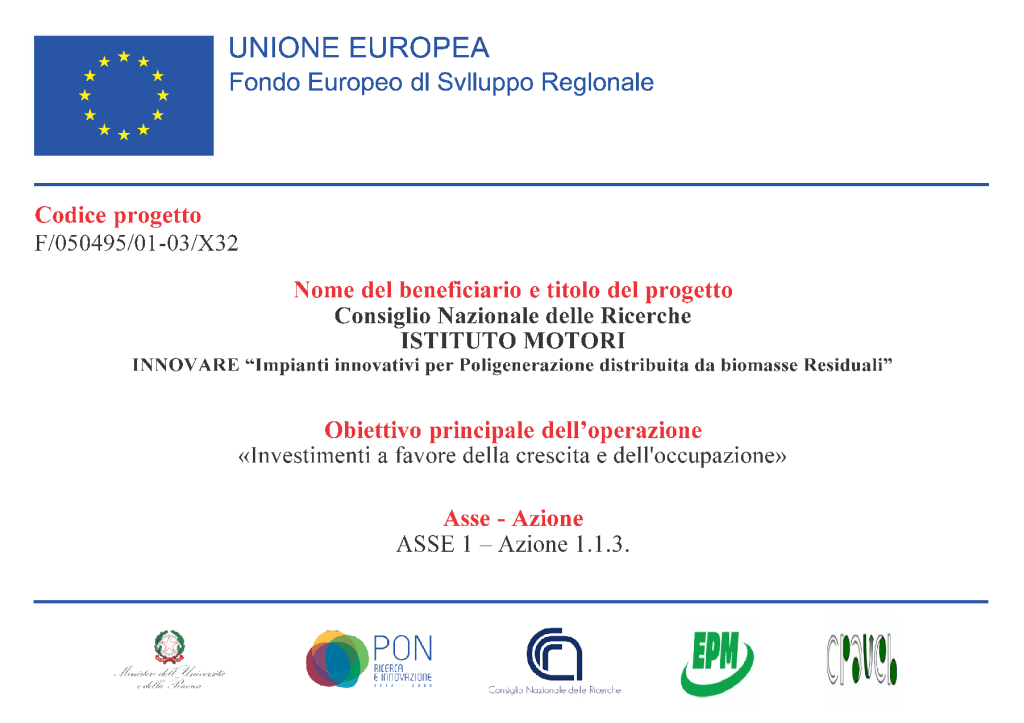INNOVARE – Innovative plants for distributed poly-generation by residual biomass
Direzione Generale per gli Incentivi alle Imprese
Progetto Ammesso al Finanziamento con Decreto n. 4700 del 20/11/2017
Responsabile Scientifico: Ing. Michela Costa
Programma: Horizon 2020 – PON Imprese e Competitività 2014-2020
Ente finanziatore: Ministero dello Sviluppo Economico
Soggetti partner: EPM s.r.l., CRAVEB – Consorzio di Ricerca per l’Ambiente, i Veicoli, l’Energia e i Biocombustibili e Istituto Motori del CNR
Costo progetto: € 673374,38
Settore/Ambito: Tecnologie volte a realizzare gli obiettivi della priorità “Sfide per la Società” prevista dal Programma Orizzonte 2020 (D.M. 1.6.2016)
Periodo: 2017-2020
Codice progetto: F/050495/01-03/X32
CUP: B88I17000270008
Sito web progetto: www.innovarebioenergia.it
Responsabile Scientifico IM-CNR: Ing. Michela Costa
Partecipanti IM-CNR: Ing. M. Costa, Ing. M. V. Prati, Ing. G. Di Blasio, Ing. M. A. Costagliola, Ing. S. Iannaccone, Ing. C. Beatrice, Ing. C. Guido, Ing. L. De Simio, Ing. B. Iorio, Dott. G. Perretta, Dr.ssa L. Barone, p.i. A. Albano, p.i. A. Schiavone, A. Piccolo, R. Maniscalco
Finanziamento IM-CNR: € 373617,97
Project details
By proposing innovative plant configurations for converting biomass into directly usable energy near the collection or production sites, the INNOVARE project represents a concrete solution to the problem of the disposal of forest and agro-food residues.
The valorisation of residual biomasses from agricultural or agro-industrial activities assumes a decisive role as a measure aimed at translating into reality the ambitious concept of “circular economy”, that is of an economic-productive system, and also social, in which every material of waste is reused at the highest level to reduce the impact of human activities on the biosphere. Italy, given the nature of the territory and the traditional production activities, is particularly interesting for the recovery of residues deriving both from the production and processing of products of particularly widespread crops, such as grapes, tomatoes and olives, and from pruning operations which are part of the forest management activities, aimed at preventing forest fires and protecting the natural heritage.
The biomasses available, which today entail a cost to be borne by local entities, become a value in the context of INNOVATION, for the combined production of electricity, heat and cooling for decentralized users, often home to obsolete, responsible energy plants of high greenhouse gas emissions into the atmosphere. The promising prospects for the reuse of by-products such as pomace, processing waste from the agro-food industry and pruning, represented by the transformation for energy purposes, has been identified by EPM as a valid solution to the problem of disposal and an optimal possibility of applying its skills in different areas.
The intent to translate the aforementioned purposes into reality and a deep knowledge of the reality of Campania have therefore led to the creation of a specialized, transdisciplinary team with complementary skills. The EPM has in fact entered into an agreement with the CRAVEB and the Motors Institute of the National Research Council (CNR) for the proposal of the INNOVARE project and its implementation over a period of 30 months. CRAVEB is a consortium established with the aim of using and promoting biomass and promoting the development of the agro-food industry, while the CNR Motors Institute, since its foundation, has been operating internationally in the field of research aimed at energy and environmental optimization of conversion systems.
Industrial research and experimental development activities are envisaged to identify complete innovative plant solutions for various types of users, such as municipal or school buildings in mountain or rural areas, decentralized commercial complexes, agro-food industries, structures included in natural parks or protected areas.
The project, through an operational demonstration that will cover the last 6 months of duration, is aimed at verifying the sustainability of biomass energy valorisation chains through gasification and combustion of the syngas produced in alternative internal combustion engines (MCI), providing, upstream and for a period of 2 years, detailed analysis and optimization in energy and environmental terms of the individual components and individual sub-processes of a specific micro-cogeneration technology from biomass already in development. The positive performance of the planned activities may have important repercussions at national level, contributing to the spread of the use of renewable sources in areas where their penetration has been limited by the installation of systems powered by non-programmable renewable sources.
This impact is entirely in line with the main priorities of the H2020 program in the energy sector and more generally with the European priorities and the international objectives of the United Nations Framework Convention on Climate Change (UNFCCC) and subsequent Conferences of the Parties (COP).

